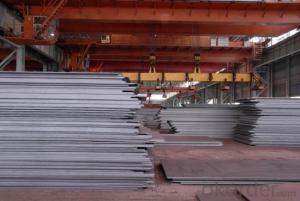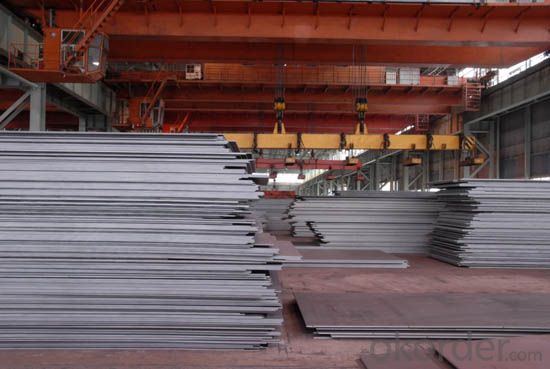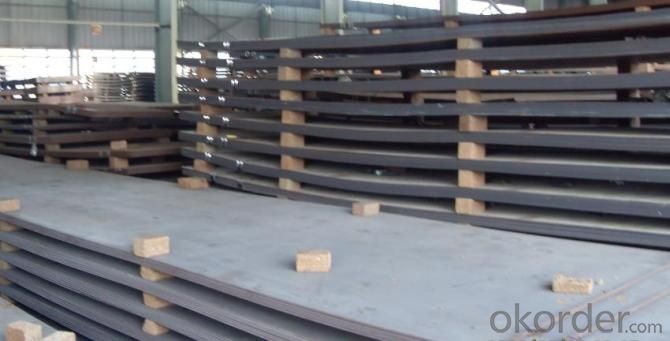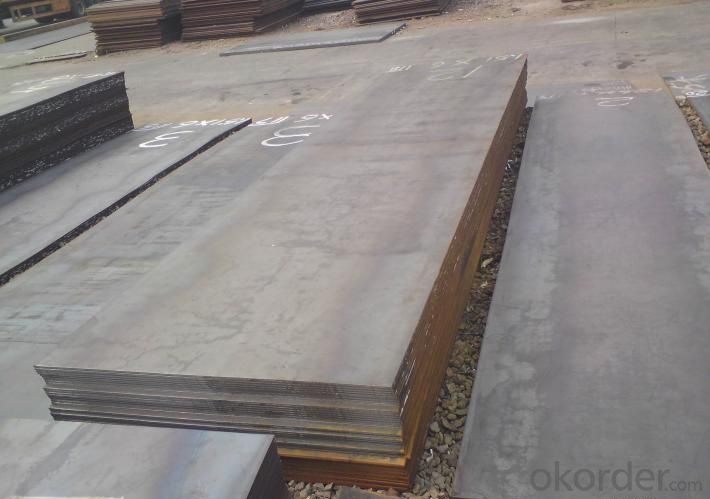Grade Q450NQR1 Corten Steel Plate 2.0*1000*3000
- Loading Port:
- Shanghai
- Payment Terms:
- TT or LC
- Min Order Qty:
- 100 m.t
- Supply Capability:
- 20000 m.t/month
OKorder Service Pledge
OKorder Financial Service
You Might Also Like
Grade Q450NQR1 Corten Steel Plate 2.0*1000*3000mm
Description:
-Grade: 09CuPCrNi-A
-Specification: 2.0*1000*3000mm
Chemical Composition(%) of Grade Q450NQR1 Corten Steel Plate 2.0*1000*3000mm:
| C | Si | Mn | P | S | Cu | Ti/V | Cr | Ni | RE |
| ≤0.12 | 0.25~0.75 | 0.20~0.50 | 0.060~0.12 | ≤0.020 | 0.25~0.50 | / | 0.30~1.25 | 0.12~0.65 | / |
Mechanical Properties of Grade Q450NQR1 Corten Steel Plate 2.0*1000*3000mm:
| Thickness(mm) | Y.S(MPa) | T.S(MPa) | EL. A5% | Bend 180o | Impact Test | |
| oC | AKV J | |||||
| 2.0~≤6.0 | ≥345 | ≥480 | ≥24 | d=a | Normal/-40 | ≥47/≥21 |
| >6.0~12.0 | d=2a | |||||
Application of Grade Q450NQR1 Corten Steel Plate 2.0*1000*3000mm:
Used in different weather. It has good anti rust protection and welding ability and is used in shipping container,support frame of outside building etc. Remarkably enhances the anti-corrosive performance of the structural element, lengthens the structural element service life, uses in manufacturing each kind of structural element which was used under the atmospheric envirenment and the caustic gas, the liquid envirenment.
Payment:
-Invoicing on theoretical weight or actual weight as customer’s request.
-FOB, CFR or CIF.
-Regular terms of payment:
1, 30% payment in advance, the remaining balance (70% payment) against the copy of B/L.
2, 30% payment in advance, the remaining balance (70% L/C) against the copy of B/L.
3, Negotiable.
-The payment terms will be written in contraction detailedly.
FAQ:
Q1: Why buy Materials & Equipment from OKorder.com?
A1: All products offered byOKorder.com are carefully selected from China's most reliable manufacturing enterprises. Through its ISO certifications, OKorder.com adheres to the highest standards and a commitment to supply chain safety and customer satisfaction.
Q2: How do we guarantee the quality of our products?
A2: We have established an advanced quality management system which conducts strict quality tests at every step, from raw materials to the final product. At the same time, we provide extensive follow-up service assurances as required.
Q3: How soon can we receive the product after purchase?
A3: Within three days of placing an order, we will arrange production. The shipping date is dependent upon the quatity, how many sizes you want and the plan of production, but is typically 1 month to 2 month days from the beginning of production.
Images of Grade Q450NQR1 Corten Steel Plate 2.0*1000*3000mm:
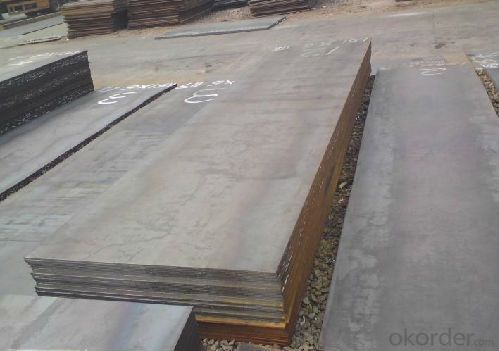
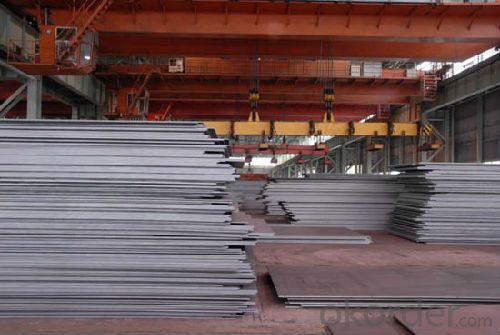
*If you would like to get our price, please inform us the size, standard/material and quantity. Thank you very much for your attention.
- Q: How is special steel tested for quality?
- Special steel is tested for quality through various processes such as chemical analysis, mechanical testing, and non-destructive testing. Chemical analysis involves checking the composition and purity of the steel to ensure it meets the required specifications. Mechanical testing includes assessing the strength, hardness, and toughness of the steel through methods like tensile testing, impact testing, and hardness testing. Non-destructive testing techniques like ultrasonic testing, magnetic particle inspection, and radiographic testing are employed to detect any defects or irregularities within the steel without causing any damage. These comprehensive tests ensure that special steel meets the necessary quality standards before it is used in various industries.
- Q: What are the different joining methods for special steel?
- The different joining methods for special steel include welding, brazing, soldering, and adhesive bonding.
- Q: Can special steel be used in the furniture manufacturing industry?
- Yes, special steel can be used in the furniture manufacturing industry. Special steel offers various advantages such as strength, durability, and corrosion resistance, making it suitable for producing sturdy and long-lasting furniture pieces. Additionally, special steel can be molded and shaped into various designs, providing flexibility and creativity in furniture manufacturing.
- Q: What are the cost implications of using special steel?
- Using special steel can have significant cost implications. Special steels are often more expensive compared to standard steels due to their specific properties and manufacturing processes. The cost of special steel can vary depending on factors such as the alloy composition, production techniques, and market demand. Additionally, using special steel may require specialized tools, equipment, and skilled labor, which can further increase the overall cost. However, it is important to consider the long-term benefits and potential cost savings that can be achieved by using special steel, such as improved durability, corrosion resistance, and enhanced performance in specific applications.
- Q: What are the specific requirements for special steel used in the nuclear fuel industry?
- The nuclear fuel industry imposes stringent and demanding requirements on special steel. These requirements are crucial to guarantee the safety and reliability of nuclear power plants. Here are some of the key specifications for special steel used in this sector: 1. Withstanding high temperatures: The special steel employed in the nuclear fuel industry must have the ability to endure high temperatures without compromising its structural integrity. This is of utmost importance as nuclear reactors generate intense heat during their operation. 2. Resisting corrosion: The nuclear fuel environments can be highly corrosive due to the presence of hot and pressurized water, radiation, and chemical reactions. Special steel used in this industry must exhibit exceptional resistance to corrosion in order to prevent deterioration and maintain safety. 3. Resisting radiation: The nuclear fuel industry involves exposure to radiation. Special steel must possess outstanding resistance to radiation damage and embrittlement in order to ensure long-term structural integrity and avoid any risk of failure. 4. High strength and toughness: Special steel used in the nuclear fuel industry should possess high strength and toughness to withstand the extreme conditions experienced within a nuclear reactor. This guarantees that the steel can endure the pressure and stress exerted on it during reactor operation. 5. Low neutron absorption: Neutron absorption is a critical factor in nuclear reactors. Special steel used in this industry should exhibit low neutron absorption properties to prevent interference with nuclear reactions and maintain reactor efficiency. 6. Stringent quality control and traceability: The manufacturing and fabrication of special steel for the nuclear fuel industry must conform to strict quality control procedures to ensure consistency and reliability. Traceability is also pivotal in identifying the origin and history of the steel, enabling comprehensive inspections and assessments. Meeting these specific requirements is crucial for the safe and efficient operation of nuclear power plants. Special steel used in the nuclear fuel industry must undergo rigorous testing, certification, and quality control processes to ensure compliance with these stringent specifications.
- Q: Can special steel be used for making marine components?
- Yes, special steel can be used for making marine components. Special steel, also known as marine grade steel, is specifically designed to withstand the harsh conditions of marine environments. These environments are exposed to corrosion, high humidity, and saltwater, which can cause regular steel to deteriorate quickly. Marine grade steel is typically made with added alloys, such as nickel, chromium, and molybdenum, which provide excellent corrosion resistance and durability. These alloys help the steel resist the corrosive effects of saltwater and prevent rusting. Additionally, special steel is often coated with protective coatings or treated to further enhance its resistance to corrosion. Marine components made from special steel include ship hulls, propellers, shafts, valves, pipelines, and various structural elements. The use of special steel ensures the longevity and reliability of these components in demanding marine conditions. Furthermore, the strength and toughness of special steel make it suitable for withstanding the high mechanical stresses and impacts experienced at sea. In summary, special steel is an ideal material for making marine components due to its superior corrosion resistance, durability, and strength. It helps to ensure the longevity and reliability of marine structures and equipment in harsh marine environments.
- Q: What are the main applications of special steel in the packaging machinery?
- Special steel is commonly used in packaging machinery for its high strength, durability, and resistance to wear and corrosion. It is primarily employed in the production of components such as blades, knives, rollers, and bearings, ensuring smooth and efficient packaging operations. Additionally, special steel's heat resistance and ability to maintain precision under extreme conditions make it suitable for applications involving high-speed packaging, cutting, and sealing processes.
- Q: How does the carbon content affect the properties of special steel?
- The carbon content plays a crucial role in determining the properties of special steel. Higher carbon content tends to enhance its hardness, strength, and wear resistance. This is because carbon forms interstitial solid solutions with iron, creating stronger and more stable iron carbides. On the other hand, lower carbon content leads to increased ductility and toughness. The carbon content also influences the steel's ability to be heat-treated, affecting its response to processes like quenching and tempering. Therefore, controlling the carbon content allows manufacturers to tailor the properties of special steel to meet specific application requirements.
- Q: How is special steel tested for quality and performance?
- Special steel is tested for quality and performance using a variety of methods, including visual inspection, mechanical testing, and chemical analysis. Visual inspection involves examining the steel for any surface defects or abnormalities. Mechanical testing involves subjecting the steel to various physical stress tests to assess its strength, hardness, toughness, and other mechanical properties. Chemical analysis is performed to check the composition of the steel, ensuring it meets the required standards and specifications. These comprehensive testing procedures are essential to guarantee the quality and performance of special steel in various applications.
- Q: What are the properties of stainless tool steel?
- Stainless tool steel possesses several important properties. Firstly, it exhibits high corrosion resistance, making it suitable for applications in moist or corrosive environments. Secondly, it demonstrates excellent hardness, allowing it to withstand heavy wear and maintain sharp cutting edges. Additionally, stainless tool steel has good toughness, enabling it to withstand impacts without breaking or chipping. Finally, it offers good dimensional stability, ensuring minimal distortion or warping during heat treatment or use. Overall, these properties make stainless tool steel an ideal material for various tooling applications.
Send your message to us
Grade Q450NQR1 Corten Steel Plate 2.0*1000*3000
- Loading Port:
- Shanghai
- Payment Terms:
- TT or LC
- Min Order Qty:
- 100 m.t
- Supply Capability:
- 20000 m.t/month
OKorder Service Pledge
OKorder Financial Service
Similar products
Hot products
Hot Searches
Related keywords
